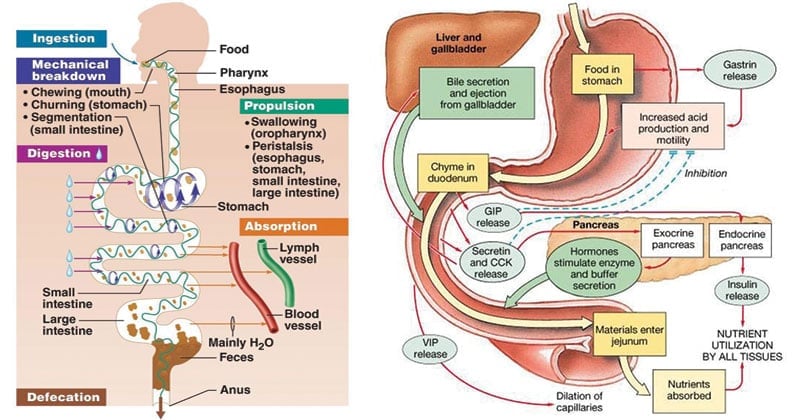
While the food is being mechanically broken down the enzymes in saliva begin to chemically process the food as well. Digestion is process that converts complex food substances to simpler ones.

Working together nerves hormones bacteria blood and the organs of your digestive system digest the foods and liquids you eat or drink each day.
Definition of ingestion in digestive system. Food enters the digestive system through the mouth. This process is called ingestion. Once in the mouth the food is chewed to form a ball of food called a bolus.
This passes down the. Ingestion is the process of taking in food through the mouth. In vertebrates the teeth saliva and tongue play important roles in mastication preparing the food into bolus.
While the food is being mechanically broken down the enzymes in saliva begin to chemically process the food as well. Definition of ingestion. The act or process of taking in something for or as if for digestion.
The act or process of ingesting something A Cochrane review showed that ingestion of cranberry products may decrease the number of symptomatic urinary tract infections in women. Functions of the Digestive System ingestion the oral cavity allows food to enter the digestive tract and have mastication chewing occurs and the resulting food bolus is swallowed. Mechanical digestion muscular movement of the digestive tract mainly.
Biology Ingestion Digestion Absorption and Assimilation in Human beings. Animal nutrition covers nutrient requirements how the food is consumed and how the body utilises the food. Digestion is process that converts complex food substances to simpler ones.
Nutrition involves the following. Ingestion digestion absorption assimilation and. Human Digestive System Notes.
The human digestive system breaks down food to release energy essential for the body to carry out its activities. The process of digestion takes place in 6 major steps. The food is ingested by the alimentary canal and is.
The digestive system ingests and digests food absorbs released nutrients and excretes food components that are indigestible. The six activities involved in this process are ingestion motility mechanical digestion chemical digestion absorption and defecation. These processes are regulated by neural and hormonal mechanisms.
Definition of digestive system. The bodily system concerned with the ingestion digestion and absorption of food and the discharge of residual wastes and consisting of the digestive tract and accessory glands such as the salivary glands and the pancreas that secrete digestive enzymes. In-jeschun the taking of food drugs liquids or other substances into the body by mouth.
The process by which food is broken down into simple chemical compounds that can be absorbed and used as nutrients or eliminated by the body is called digestion. The processes of digestion include six activities. Ingestion propulsion mechanical or physical digestion chemical digestion absorption and defecation.
Ingestion is the initial process of the digestive tract. After the ingestion food runs through the gastrointestinal tract and absorption of nutrients is taken place by digestion. Ingestion is a major path that enables pathogens to get into the body through contaminated food and water.
Digestive system definition the system by which ingested food is acted upon by physical and chemical means to provide the body with absorbable nutrients and to excrete waste products. In mammals the system includes the alimentary canal extending from the mouth to the anus and the hormones and enzymes assisting in digestion. Ingestion and digestion are two actions that occur in the alimentary canal of animals.
The main difference between ingestion and digestion is that ingestion is the taking of food into the body. Digestion is defined as the process of breaking down large insoluble molecules of food into smaller water-soluble molecules which can then be readily absorbed by the body. Digestion is one among many life processes observed in nearly all living organisms.
The process involves breaking down complex molecules into simpler. Working together nerves hormones bacteria blood and the organs of your digestive system digest the foods and liquids you eat or drink each day. Why is digestion important.
Digestion is important because your body needs nutrients from food and drink to work properly and stay healthy. The system that comprises the organs that help in the digestion of the food and the passage that help in its transport is known as the digestive system.